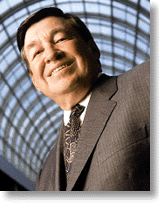 Max D. Hopper is the President of Max D. Hopper Associates Inc. in Dallas.
Max D. Hopper is the President of Max D. Hopper Associates Inc. in Dallas.
Max Hopper is the pre-eminent modern-era CIO and a founding father of IT-inspired competitive advantage.
“He was without a doubt the first person who really defined the marketing leverage that could come from using technology,” says professor James I. Cash Jr. of the Harvard Business School, referring to the impact American Airlines’ Sabre reservation system had on the travel agency market. In doing so, Hopper also legitimized the role of the CIO. “He made it clear that there was a unique contribution to be made by someone who understood technology and could help influence the business strategy decisions being made,” Cash says.
But Hopper’s competitive-advantage legacy isn’t confined to Sabre. He also kept the company out of the quagmire of silo systems.
“Back in the early 1970s, we in effect tied the operational side of the airline together in a common information stream,” Hopper recalls. “To some degree, it avoided the vertical silos a lot of other companies got stuck with, and it gave us a leg u p in running the airline.” In the late 1980s, with full support from Chairman and CEO Robert L. Crandall, Hopper extended that advantage by similarly tying together the business side of American. InterAAct, the resulting landmark desktop network, gave users common desktop tools and a common means of accessing legacy systems and laid the path for ongoing systems integration. “I dare say there isn’t an American Airlines office in the world today that isn’t in some way tied into that system,” Hopper says.
The foresightful InterAAct system was another example of Hopper’s ability to integrate his grasp of IT’s strategic implications with his understanding of business concepts and project what it all could mean for the company. Joyce Wrenn, vice president of information technologies and CIO at Union Pacific Railroad Co., worked for Hopper on InterAAct. The experience taught her a valuable lesson about timing. “Timing is critical in applying technology to a business problem,” she says. “You don’t just go out and assume that if it’s good technology, it’s time to apply it. If you time it too early, you spend far more money than you should. If you time it too late, you won’t get the full advantage.”
Both Wrenn and Cash point out that Hopper’s influence and success owed a lot to his ability to gain management support. “Even if you have people capable of being Max Hoppers, [they’ll] never get the opportunity unless you have Bob Crandalls,” Cash says. “There’s nothing you can do by yourself.” Cash attributes Hopper’s good relations to his understated and self-effacing demeanor, which was “very different from the benevolent dictator attitude characteristic of the ‘data processing managers’ of the time.”
Still self-effacing, Hopper says being a CIO these days is harder than it was when he was in the role. Today, decisions are more critical, and they must be made faster, he says. Also, IT and the decisions of the CIO touch more people in the company in more ways than ever before. “Sometimes I get the itch to go do it again, especially with the knowledge I have today that I wish I had back then,” Hopper says, laughing. “But I’m old enough now to realize you need a younger person today to do this job. “
